- Home
- Thomas Hardy
Complete Works of Thomas Hardy (Illustrated)
Complete Works of Thomas Hardy (Illustrated) Read online
THE COMPLETE WORKS OF
THOMAS HARDY
(1840-1928)
Contents
The Novels
THE POOR MAN AND THE LADY
AN INDISCRETION IN THE LIFE OF AN HEIRESS
DESPERATE REMEDIES
UNDER THE GREENWOOD TREE
A PAIR OF BLUE EYES
FAR FROM THE MADDING CROWD
THE HAND OF ETHELBERTA
THE RETURN OF THE NATIVE
THE TRUMPET-MAJOR
A LAODICEAN
TWO ON A TOWER
THE MAYOR OF CASTERBRIDGE
THE WOODLANDERS
TESS OF THE D’URBERVILLES
JUDE THE OBSCURE
THE WELL-BELOVED
The Short Story Collections
WESSEX TALES
LIFE’S LITTLE IRONIES
A GROUP OF NOBLE DAMES
The Short Stories
CHRONOLOGICAL LIST OF HARDY’S SHORT STORIES
ALPHABETICAL LIST OF HARDY’S SHORT STORIES
The Poetry Collections
WESSEX POEMS AND OTHER VERSES
POEMS OF THE PAST AND THE PRESENT
TIME’S LAUGHINGSTOCKS AND OTHER VERSES
SATIRES OF CIRCUMSTANCE
MOMENTS OF VISION AND MISCELLANEOUS VERSES
LATE LYRICS AND EARLIER WITH MANY OTHER VERSES
HUMAN SHOWS FAR PHANTASIES SONGS, AND TRIFLES
WINTER WORDS IN VARIOUS MOODS AND METRES
The Poems
LIST OF POEMS IN CHRONOLOGICAL ORDER
LIST OF POEMS IN ALPHABETICAL ORDER
The Plays
THE DYNASTS
TRAGEDY OF THE QUEEN OF CORNWALL
The Criticism
A STUDY OF THOMAS HARDY by D.H. Lawrence
THOMAS HARDY by Leon H. Vincent
THE LYRICAL POETRY OF THOMAS HARDY by Edmund Gosse
UNDER FRENCH ENCOURAGEMENT by David Christie Murray
THOMAS HARDY by John Cowper Powys
A NOTE ON THE GENIUS OF THOMAS HARDY by Arthur Symons
The Biographies
THE EARLY LIFE OF THOMAS HARDY, 1841–1891 by Florence Hardy
THE LATER YEARS OF THOMAS HARDY, 1892–1928 by Florence Hardy
Hardy’s Wessex Map
© Delphi Classics 2012
Version 7
THE COMPLETE WORKS OF
THOMAS HARDY
The Novels
Thomas Hardy’s birthplace, Higher Bockhampton, Dorset
Thomas Hardy’s parents — his father Thomas was a successful stonemason and his mother Jemima was well-educated.
THE POOR MAN AND THE LADY
This was the title of Hardy’s very first novel, written in 1867 and never published. After the manuscript had been rejected by several publishers, Hardy gave up his attempts to sell the novel in its original form. Nevertheless, he used some of the novel’s scenes and themes in later works, particularly in the poem “The Poor Man and the Lady” and in the novella An Indiscretion in the Life of an Heiress (1878).
Sadly, the manuscript no longer exists. Hardy destroyed the last surviving fragment in his last years, after giving up an attempt of rewriting the novel.
Here is the surviving poem based on the lost novel:
AN EXPOSTULATION
The Poor Man and the Lady
Why want to go afar
Where pitfalls are,
When all we swains adore
Your featness more and more
As heroine of our artless masquings here,
And count few Wessex’ daughters half so dear?
Why paint your appealing face,
When its born grace
Is such no skill can match
With powder, puff, or patch,
Whose every touch defames your bloomfulness,
And with each stain increases our distress?
Yea, is it not enough
That (rare or rough
Your lines here) all uphold you,
And as with wings enfold you,
But you must needs desert the kine-cropt vale
Wherein your foredames gaily filled the pail?
Here is the novella influenced by Hardy’s first novel:
AN INDISCRETION IN THE LIFE OF AN HEIRESS
CONTENTS
CHAPTER I.
CHAPTER II.
CHAPTER III.
CHAPTER IV.
CHAPTER V.
CHAPTER VI.
CHAPTER VII.
CHAPTER VIII.
Hardy in 1856, aged 16
CHAPTER I.
When I would pray and think, I think and pray
To several subjects: heaven hath my empty words;
Whilst my invention, hearing not my tongue,
Anchors on Isabel.
The congregation in Tollamore church were singing the evening hymn, the people gently swaying backwards and forwards like trees in a soft breeze. The heads of the village children, who sat in the gallery, were inclined to one side as they uttered their shrill notes, their eyes listlessly tracing some crack in the old walls, or following the movement of a distant bough or bird, with features rapt almost to painfulness.
In front of the children stood a thoughtful young man, who, was plainly enough the schoolmaster; and his gaze was fixed on a remote part of the aisle beneath him. When the singing was over, and all had sat down for the sermon, his eyes still remained in the same place. There was some excuse for their direction, for it was in a straight line forwards; but their fixity was only to be explained by some object before them, This was a square pew, containing one solitary sitter. But that sitter was a young lady, and a very sweet lady was she.
Afternoon service in Tollamore parish was later than in many others in that neighbourhood; and as the darkness deepened during the progress of the sermon, the rector’s pulpit candles shone to the remotest nooks of the building, till at length they became the sole lights of the congregation. The lady was the single person besides the preacher whose face was turned westwards, the pew that she occupied being the only one in the church in which the seat ran all round. She reclined in her corner, her bonnet and dark dress growing by degrees invisible, and at last only her upturned face could be discerned, a solitary white spot against the black surface of the wainscot. Over her head rose a vast marble monument, erected to the memory of her ancestors, male and female; for she was one of high standing in that parish. The design consisted of a winged skull and two cherubim, supporting a pair of tall Corinthian columns, between which spread a broad slab, containing the roll of ancient names, lineages, and deeds, and surmounted by a pediment, with the crest of the family at its apex.
As the youthful schoolmaster gazed, and all these details became dimmer, her face was modified in his fancy, till it seemed almost to resemble the carved marble skull immediately above her head. The thought was unpleasant enough to arouse him from his half-dreamy state, and he entered on rational considerations of what a vast gulf lay between that lady and himself, what a troublesome world it was to live in where such divisions could exist, and how painful was the evil when a man of his unequal history was possessed of a keen susceptibility.
Now a close observer, who should have happened to be near the large pew, might have noticed before the light got low that the interested gaze of the young man had been returned from time to time by the young lady, although he, towards whom her glances were directed, did not perceive the fact. It would have been guessed, that something in the past was common to both, notwithstanding their difference in social standing. What that was may be related in a few words.
One day in the previous week there had been some exc
itement in the parish on account of the introduction upon the farm of a steam threshing-machine for the first time, the date of these events being some thirty years ago. The machine had been hired by a farmer who was a relative of the schoolmaster’s, and when it was set going all the people round about came to see it work. It was fixed in a corner of a field near the main road, and in the afternoon a passing carriage stopped outside the hedge. The steps were let down, and Miss Geraldine Allenville, the young woman whom we have seen sitting in the church pew, came through the gate of the field towards the engine. At that hour most of the villagers had been to the spot, had gratified their curiosity, and afterwards gone home again; so that there were only now left standing beside the engine the engine-man, the farmer, and the young schoolmaster, who had come like the rest. The labourers were at the other part of the machine, under the cornstack some distance off.
The girl looked with interest at the whizzing wheels, asked questions of the old farmer, and remained in conversation with him for some time, the schoolmaster standing a few paces distant, and looking more or less towards her. Suddenly the expression of his face changed to one of horror; he was by her side in a moment, and, seizing hold of her, he swung her round by the arm to a distance of several feet.
In speaking to the farmer she had inadvertently stepped backwards, and had drawn so near to the band which ran from the engine to the drum of the thresher that In another moment her dress must have been caught, and she would have been whirled round the wheel as a mangled carcase. As soon as the meaning of the young man’s act was understood by her she turned deadly pale and nearly fainted. When she was well enough to walk, the two men led her to the carriage, which had been standing outside the hedge all the time.
“You have saved me from a ghastly death!” the agitated girl murmured to the schoolmaster. “Oh! I can never forget it!” and then she sank into the carriage and was driven away.
On account of this the schoolmaster had been invited to Tollamore House to explain the incident to the squire, the young lady’s only living parent. Mr. Allenville thanked her preserver, inquired the history of his late father, a painter of good family, but unfortunate and improvident; and finally told his visitor that, if he were fond of study, the library of the house was at his service. Geraldine herself had spoken very impulsively to the young man — almost, indeed, with imprudent warmth — and his tender interest in her during the church service was the result of the sympathy she had shown.
And thus did an emotion, which became this man’s sole motive power through many following years, first arise and establish itself. Only once more did she lift her eyes to where he sat, and it was when they all stood up before leaving. This time he noticed the glance. Her look of recognition led his feelings onward yet another stage. Admiration grew to be attachment; he even wished that he might own her, not exactly as a wife, but as a being superior to himself in the sense in which a servant may be said to own a master. He would have cared to possess her in order to exhibit her glories to the world, and he scarcely even thought of her ever loving him.
There were two other stages in his course of love, but they were not reached till some time after to-day. The first was a change from this proud desire to a longing to cherish. The last stage, later still, was when her very defects became rallying-points for defence, when every one of his senses became special pleaders for her; and that not through blindness, but from a tender inability to do aught else than defend her against all the world.
CHAPTER II.
She was active, stirring, all fire —
Could not rest, could not tire —
Never in all the world such an one!
And here was plenty to he done,
And she that could do it, great or small,
She was to do nothing at all.
Five mornings later the same young man was looking out of the window of Tollamore village school in a fixed and absent manner. The weather was exceptionally mild, though scarcely to the degree which would have justified his airy situation at such a month of the year. A hazy light spread through the air, the landscape on which his eyes were resting being enlivened and lit up by the spirit of an unseen sun rather than by its direct rays. Every sound could be heard for miles. There was a great crowing of cocks, bleating of sheep, and cawing of rooks, which proceeded from all points of the compass, rising and falling as the origin of each sound was near or far away. There were also audible the voices of people in the village, interspersed with hearty laughs, the bell of a distant flock of sheep, a robin close at hand, vehicles in the neighbouring roads and lanes. One of these latter noises grew gradually more distinct, and proved itself to be rapidly nearing the school. The listener blushed as he heard it.
“Suppose it should be!” he said to himself.
He had said the same thing at every such noise that he had heard during the foregoing week, and had been mistaken in his hope. But this time a certain carriage did appear in answer to his expectation. He came from the window hastily; and in a minute a footman knocked and opened the school door.
“Miss Allenville wishes to speak to you, Mr. Mayne.”
The schoolmaster went to the porch — he was a very young man to be called a schoolmaster — his heart beating with excitement.
“Good morning,” she said, with a confident yet girlish smile. “My father expects me to inquire into the school arrangements, and I wish to do so on my own account as well. May I come in?”
She entered as she spoke, telling the coachman to drive to the village on some errand, and call for her in half an hour.
Mayne could have wished that she had not been so thoroughly free from all apparent consciousness of the event of the previous week, of the fact that he was considerably more of a man than the small persons by whom the apartment was mainly filled, and that he was as nearly as possible at her own level in age, as wide in sympathies, and possibly more inflammable in heart. But he soon found that a sort of fear to entrust her voice with the subject of that link between them was what restrained her. When he had explained a few details of routine she moved away from him round the school.
He turned and looked at her as she stood among the children. To his eyes her beauty was indescribable. Before he had met her he had scarcely believed that any woman in the world could be so lovely. The clear, deep eyes, full of all tender expressions; the fresh, subtly-curved cheek, changing its tones of red with the fluctuation of each thought; the ripe tint of her delicate mouth, and the indefinable line where lip met lip; the noble bend of her neck, the wavy lengths of her dark brown hair, the soft motions of her bosom when she breathed, the light fall of her little feet, the elegant contrivances of her attire, all struck him as something he had dreamed of and was not actually seeing. Geraldine Allenville was, in truth, very beautiful; she was a girl such as his eyes had never elsewhere beheld; and her presence here before his face kept up a sharp struggle of sweet and bitter within him.
He had thought at first that the flush on her face was caused by the fresh air of the morning; but, as it quickly changed to a lesser hue, it occurred to Mayne that it might after all have arisen from shyness at meeting him after her narrow escape. Be that as it might, their conversation, which at first consisted of bald sentences, divided by wide intervals of time, became more frequent, and at last continuous. He was painfully soon convinced that her tongue would never have run so easily as it did had it not been that she thought him a person on whom she could vent her ideas without reflection or punctiliousness — a thought, perhaps, expressed to herself by such words as, “I will say what I like to him, for he is only our schoolmaster.”
“And you have chosen to keep a school,” she went on, with a shade of mischievousness in her tone, looking at him as if she thought that, had she been a man capable of saving people’s lives, she would have done something much better than teaching. She was so young as to habitually think thus of other persons’ courses.
“No,” he said simply; “I don’t choose to keep
a school in the sense you mean, choosing it from a host of pursuits, all equally possible.”
“How came you here, then?”
“I fear more by chance than by aim.”
“Then you are not very ambitious?”
“I have my ambitions, such as they are.”
“I thought so. Everybody has nowadays. But it is a better thing not to be too ambitious, I think.”
“If we value ease of mind, and take an economist’s view of our term of life, it may be a better thing.”
Having been tempted, by his unexpectedly cultivated manner of speaking, to say more than she had meant to say, she found it embarrassing either to break off or to say more, and in her doubt she stooped to kiss a little girl.
“Although I spoke lightly of ambition,” she observed, without turning to him, “and said that easy happiness was worth most, I could defend ambition very well, and in the only pleasant way.”
“And that way?”
“On the broad ground of the loveliness of any dream about future triumphs. In looking back there is a pleasure in contemplating a time when some attractive thing of the future appeared possible, even though it never came to pass.”
Mayne was puzzled to hear her talk in this tone of maturity. That such questions of success and failure should have occupied his own mind seemed natural, for they had been forced upon him by the difficulties he had encountered in his pursuit of a career. He was not just then aware how very unpractical the knowledge of this sage lady of seventeen really was; that it was merely caught up by intercommunication with people of culture and experience, who talked before her of their theories and beliefs till she insensibly acquired their tongue.
The carriage was heard coming up the road. Mayne gave her the list of the children, their ages, and other particulars which she had called for, and she turned to go out. Not a word had been said about the incident by the threshing-machine, though each one could see that it was constantly in the other’s thoughts. The roll of the wheels may or may not have reminded her of her position in relation to him. She said, bowing, and in a somewhat more distant tone: “We shall all be glad to learn that our schoolmaster is so — nice; such a philosopher.” But, rather surprised at her own cruelty in uttering the latter words, she added one of the sweetest laughs that ever came from lips, and said, in gentlest tones, “Good morning; I shall always remember what you did for me. Oh! it makes me sick to think of that moment. I came on purpose to thank you again, but I could not say it till now!

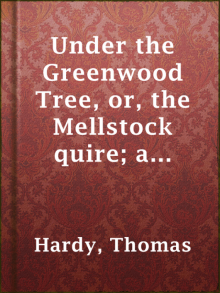 Under the Greenwood Tree; Or, The Mellstock Quire
Under the Greenwood Tree; Or, The Mellstock Quire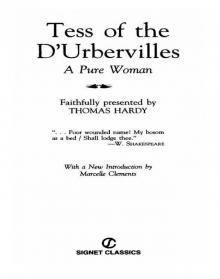 Tess of the D'Urbervilles
Tess of the D'Urbervilles Desperate Remedies
Desperate Remedies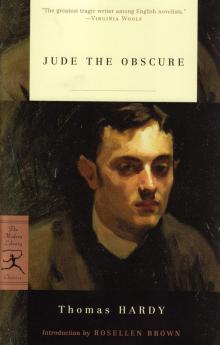 Jude the Obscure
Jude the Obscure Two on a Tower
Two on a Tower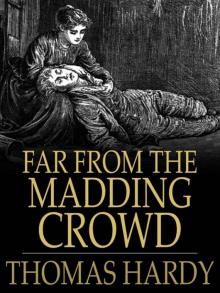 Far from the Madding Crowd
Far from the Madding Crowd The Return of the Native
The Return of the Native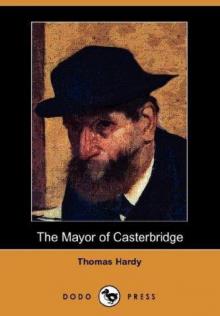 The Mayor of Casterbridge
The Mayor of Casterbridge The Well-Beloved
The Well-Beloved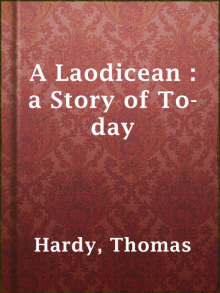 A Laodicean : A Story of To-day
A Laodicean : A Story of To-day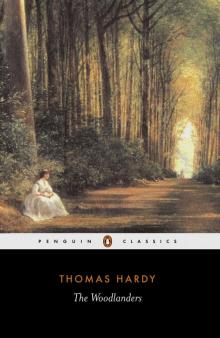 The Woodlanders
The Woodlanders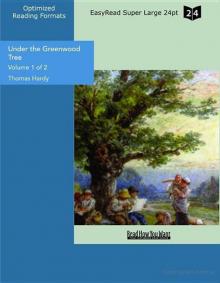 Under the Greenwood Tree
Under the Greenwood Tree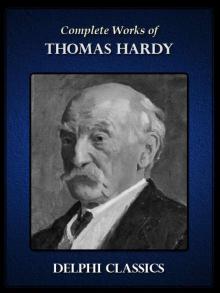 Complete Works of Thomas Hardy (Illustrated)
Complete Works of Thomas Hardy (Illustrated)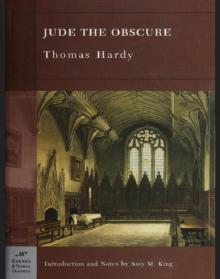 Jude the Obscure (Barnes & Noble Classics Series)
Jude the Obscure (Barnes & Noble Classics Series) The Distracted Preacher
The Distracted Preacher